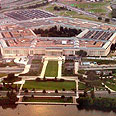
Pentagon (archive)
Photo: Reuters
Strained Relations
Yitzhak Benhorin
NBC reports Pentagon urges trial use of Israeli TROPHY system for AFVs in Iraq but army blocks testing, may have presented misleading information to Congress to ensure purchase of US system only available in 2011
McCormick's remarks are bound to feed Israeli hopes for more advanced US arms sales and technology. Last month, the Bush administration offered Israel, the closest US Mideast ally, a record $30 billion, 10-year military aid package as part of an enhanced regional bulwark against Iran.
"I must say that I can't be any prouder of the work that the Israelis have done," McCormick told an international defense industry conference called Common Defense, or Comdef 2007.
Although Israel and the United States have close security ties, they have been at odds over Israel's sale of security equipment and technology to China and other countries.
In the eyes of US strategists, such sales to China could undercut any US defense of Taiwan if China resorts to force to unite the self-ruled island with the mainland.
In 2000, Washington persuaded Israel to cancel the sale to Beijing of the Phalcon - an advanced, airborne early-warning system. More recently, the Defense Department reacted angrily after Israel agreed to upgrade Harpy anti-radar drones it sold to China in the 1990s.
In response, the Pentagon suspended Israel's access to data on the F-35 Joint Strike Fighter aircraft being built by Lockheed Martin Corp.
Until the Israeli government beefed up its export control system, it had "hardly any controls" of dual-use technology with potential military and commercial applications, McCormick said. Basically, it let Israeli industry make decisions about to whom it would sell, she added.
McCormick said she was "very sympathetic" to Israeli counterparts' challenge of supporting local manufacturers who must sell as much as 75 percent of their output abroad to stay afloat, a far higher share than US military contractors.
But she said she had a "a very high level of confidence" in the effectiveness of the export-control process now in place among Israel's ministries of defense, foreign affairs and industry. She also welcomed new laws that impose substantial penalties for violations of regulations.















